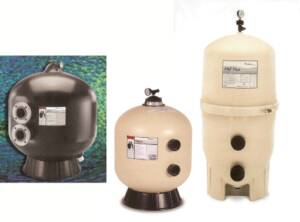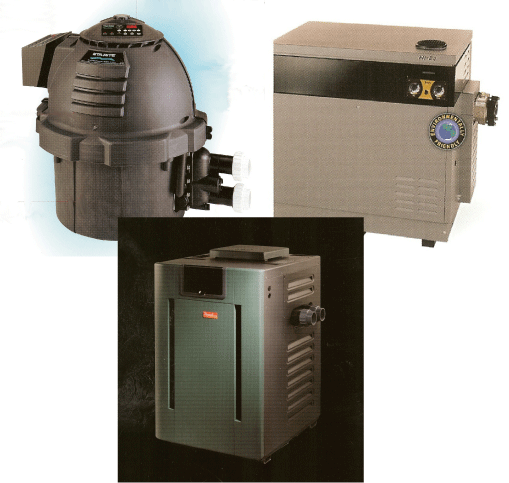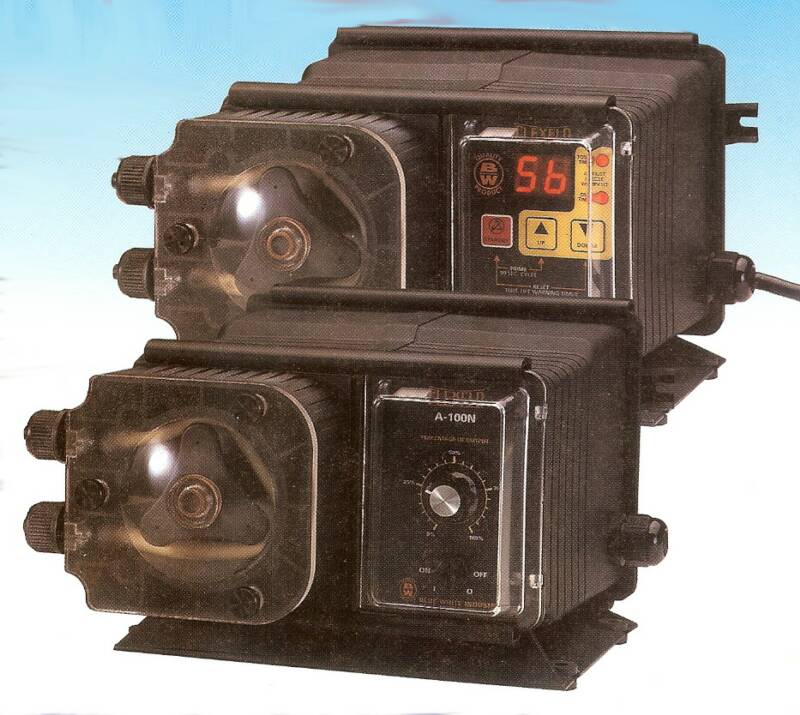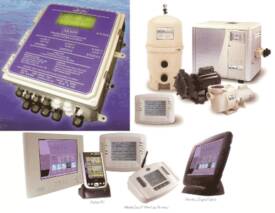All Clear Pools works with a variety of suppliers to provide the appropriate equipment for each client’s particular technical requirements and budget. These are some of the ways that the right equipment can make an enormous difference in the enjoyment and longevity of pools and spas.
Pumps | Filter | Heaters | Chlorinators & Brominators | Controllers
 When selecting pumps, we look for efficiency, durability, low noise, ease of cleaning, and ease of maintenance. A pump’s efficiency is achieved by combining the appropriate amount of water flow per horsepower. The impeller and motor work together to provide the best flow efficiencies through the inlet and outlet ports. Higher flow efficiency equates to reduced energy consumption and reduced operating costs. The material components of the pumps we use are designed to withstand the effects of heat and corrosive chemicals over time, reducing the need for replacements. For advanced applications, variable speed, permanent magnet motor technology is often employed. These motors can reduce the energy usage from 30% to 90% while reducing the stress on critical pump components.
When selecting pumps, we look for efficiency, durability, low noise, ease of cleaning, and ease of maintenance. A pump’s efficiency is achieved by combining the appropriate amount of water flow per horsepower. The impeller and motor work together to provide the best flow efficiencies through the inlet and outlet ports. Higher flow efficiency equates to reduced energy consumption and reduced operating costs. The material components of the pumps we use are designed to withstand the effects of heat and corrosive chemicals over time, reducing the need for replacements. For advanced applications, variable speed, permanent magnet motor technology is often employed. These motors can reduce the energy usage from 30% to 90% while reducing the stress on critical pump components.Filters range from the easy-to-operate residential cartridge filter to the most robust  commercial sand filters. Cartridge filters have the ability to trap and remove tiny particles from swimming pool water with a material that is long-lasting and easy to clean. The trapped particles remain in a cartridge that is easy to remove, rinse, and return to the filter. Cartridge filters are efficient while simple to maintain. Diatomaceous Earth (DE) filters are another reliable and excellent performing method of filtration. DE is introduced into the filter to coat a fabric that covers the filter grids. The DE traps tiny dirt particles (measured in microns) as water flows over the grids. Cleaning is achieved by reversing the water flow in the filter. Sand filters offer the most efficient filtration for commercial and residential use. An even water flow over a level sand bed results in the most efficient filtration possible. Cleaning is achieved through backwashing.
commercial sand filters. Cartridge filters have the ability to trap and remove tiny particles from swimming pool water with a material that is long-lasting and easy to clean. The trapped particles remain in a cartridge that is easy to remove, rinse, and return to the filter. Cartridge filters are efficient while simple to maintain. Diatomaceous Earth (DE) filters are another reliable and excellent performing method of filtration. DE is introduced into the filter to coat a fabric that covers the filter grids. The DE traps tiny dirt particles (measured in microns) as water flows over the grids. Cleaning is achieved by reversing the water flow in the filter. Sand filters offer the most efficient filtration for commercial and residential use. An even water flow over a level sand bed results in the most efficient filtration possible. Cleaning is achieved through backwashing.
 commercial sand filters. Cartridge filters have the ability to trap and remove tiny particles from swimming pool water with a material that is long-lasting and easy to clean. The trapped particles remain in a cartridge that is easy to remove, rinse, and return to the filter. Cartridge filters are efficient while simple to maintain. Diatomaceous Earth (DE) filters are another reliable and excellent performing method of filtration. DE is introduced into the filter to coat a fabric that covers the filter grids. The DE traps tiny dirt particles (measured in microns) as water flows over the grids. Cleaning is achieved by reversing the water flow in the filter. Sand filters offer the most efficient filtration for commercial and residential use. An even water flow over a level sand bed results in the most efficient filtration possible. Cleaning is achieved through backwashing.
commercial sand filters. Cartridge filters have the ability to trap and remove tiny particles from swimming pool water with a material that is long-lasting and easy to clean. The trapped particles remain in a cartridge that is easy to remove, rinse, and return to the filter. Cartridge filters are efficient while simple to maintain. Diatomaceous Earth (DE) filters are another reliable and excellent performing method of filtration. DE is introduced into the filter to coat a fabric that covers the filter grids. The DE traps tiny dirt particles (measured in microns) as water flows over the grids. Cleaning is achieved by reversing the water flow in the filter. Sand filters offer the most efficient filtration for commercial and residential use. An even water flow over a level sand bed results in the most efficient filtration possible. Cleaning is achieved through backwashing. Heaters are often the workhorse of swimming pools, dramatically extending the swimming season for residential and commercial pools and spas regardless of weather. Heaters for pools and spas must offer high thermal energy efficiency, while providing consistent temperatures and reliable operation. In addition to overall efficiency, we look for operating economy, dependability, and ease of maintenance in pool heaters. The higher-end heaters have on-board diagnostic controls that let the pool or spa owner and service professional know what is going on at all times. Many of the more advanced heaters are also designed to meet the standards for lower NOx emissions.
Heaters are often the workhorse of swimming pools, dramatically extending the swimming season for residential and commercial pools and spas regardless of weather. Heaters for pools and spas must offer high thermal energy efficiency, while providing consistent temperatures and reliable operation. In addition to overall efficiency, we look for operating economy, dependability, and ease of maintenance in pool heaters. The higher-end heaters have on-board diagnostic controls that let the pool or spa owner and service professional know what is going on at all times. Many of the more advanced heaters are also designed to meet the standards for lower NOx emissions. Chlorinators and Brominators are designed to automatically maintain proper chlorine or >bromine levels in swimming pools and spas. Proper chlorine or bromine levels are important for keeping bodies of water free of bacteria and algae. An automatic chlorinator/brominator also reduces the need to purchase, handle, and store chlorine/bromine, saving time and money.
Chlorinators and Brominators are designed to automatically maintain proper chlorine or >bromine levels in swimming pools and spas. Proper chlorine or bromine levels are important for keeping bodies of water free of bacteria and algae. An automatic chlorinator/brominator also reduces the need to purchase, handle, and store chlorine/bromine, saving time and money.
Pool & Spa controllers are designed to eliminate concerns over scheduling and operating pool and spa filtration, heating, and cleaning. They also help effectively manage equipment for peak energy efficiency and help reduce the cost of operations. There are controllers designed to manage all of the electrical circuitry for pool and spa equipment, including lighting and water features. More advanced systems can be used to manage multiple bodies of water with shared equipment or multiple bodies of water with separate equipment. In the case of a spa built into a pool, they allow the operator to change from pool circulation to spa-only circulation for rapid heat up, and to turn on the jets. A controller can allow a pool owner with a pump & motor, jet pump, heater, & filter to switch from pool mode to spa mode with the  touch of a button. Controllers can interface with a variety of devices, including standard control panels, touch screens, cellphones, wireless digital tablets, and wireless remote push-button screens.
touch of a button. Controllers can interface with a variety of devices, including standard control panels, touch screens, cellphones, wireless digital tablets, and wireless remote push-button screens.
 touch of a button. Controllers can interface with a variety of devices, including standard control panels, touch screens, cellphones, wireless digital tablets, and wireless remote push-button screens.
touch of a button. Controllers can interface with a variety of devices, including standard control panels, touch screens, cellphones, wireless digital tablets, and wireless remote push-button screens.Chemical Controllers
Chemical feed controllers act like “masters” telling the chlorine and acid feed pumps when to open and for how many seconds to run. They pause and read what’s in the water using sensing probes enabling the smart management of chemicals.
